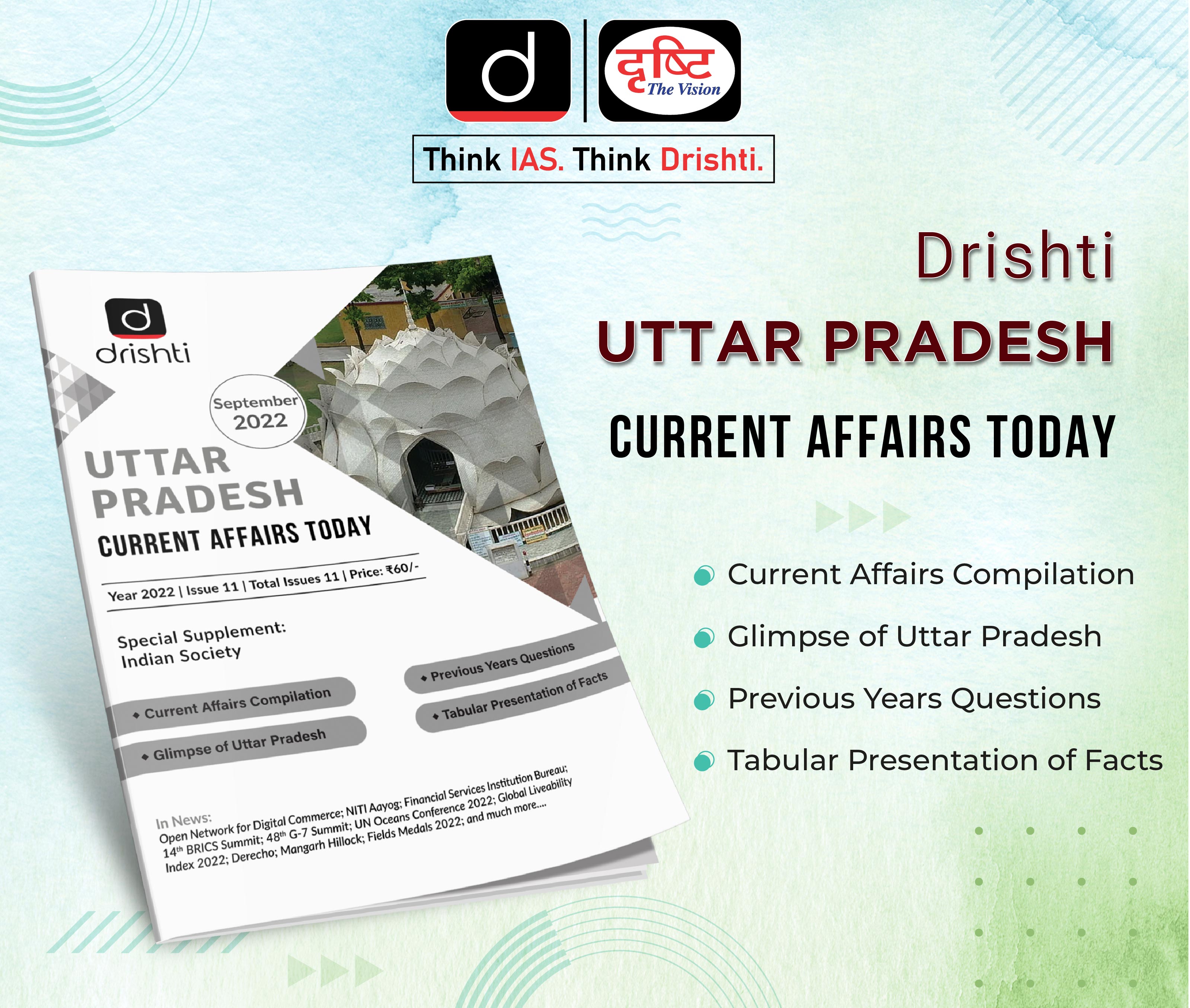Uttar Pradesh Switch to Hindi
'State Planning Commission' Now 'State Transformation Commission'
Why In News?
- In a meeting of the Uttar Pradesh Cabinet chaired by Chief Minister Yogi Adityanath on September 27, 2022, the State Planning Commission was reconstituted and renamed as the State Transformation Commission.
Key Points
- Uttar Pradesh Power Minister AK Sharma told reporters that the State Transformation Commission (STC) will be headed by the Chief Minister while the Finance Minister, both Deputy CMs, Agriculture Minister, Social Welfare Minister, Panchayati Raj Development Minister, Industrial Development Minister, Water Resources Minister and Urban Development Minister will be its members.
- The vice-president of STC will be a renowned economist or social scientist. The other members include chief secretary, additional chief secretary and principal secretaries of various departments including finance, agriculture, rural development, medical and health, industrial development and planning.
- The commission will also have non-official members, experts in the social sector, agriculture and economy. The term of these nominated members will be three years, which can be extended up to two years.
- Power Minister A K Sharma said the commission will act as a think tank and formulate policies after consultations with experts from various departments. The problems that the state is facing will be identified by the Commission and ways to solve them will be found. The use of PPP model will also be discussed. The present plan and their outcome will be evaluated by the Commission.
- The Planning Commission was set up in Uttar Pradesh on August 24 , 1972 and helped the state government formulate policies by identifying need-based areas.


Uttar Pradesh Switch to Hindi
New Bio-Energy Policy to Help Reduce Fossil Fuel Use
Why In News?
- In a meeting of the Uttar Pradesh Cabinet chaired by Chief Minister Yogi Adityanath on September 27, 2022, it was decided to implement a bio-energy policy to reduce the use of fossil fuels as well as increase the income of farmers.
Key Points
- Uttar Pradesh Power Minister AK Sharma told reporters that the Uttar Pradesh government has taken this decision while speeding up its commitment to increase the use of bio-fuels. The new policy has been formulated to finalize the possibilities of setting up bio-energy enterprises in the state by removing the shortcomings of the previous policies.
- Agricultural waste, agricultural produce market waste, livestock waste, sugar mill waste, urban waste and other organic waste available in abundance will be used to generate bio-fuels.
- Under the Bio-Energy Enterprise Promotion Programme-2018, 100 percent exemption in stamp duty on land purchase and 100 percent reimbursement of SGST has been given to bio-energy enterprises for ten years from the date of commencement of production.
- The term of the new policy will be five years. Bio-energy projects (compressed biogas, bio-coal, bio-ethanol and bio-diesel) to be set up in the state during this period will be encouraged.
- Under this policy, subsidy on compressed biogas production will be given at the rate of Rs 75 lakh per ton to a maximum of Rs 20 crore. This subsidy will be Rs 75,000 per tonne on bio-coal production and up to Rs 20 crore and Rs 3 lakh per kiloliter on production of biodiesel.
Uttar Pradesh Switch to Hindi
Uttar Pradesh Micro, Small and Medium Enterprises Promotion Policy-2022
Why In News?
- The Uttar Pradesh Micro, Small and Medium Enterprises Promotion Policy-2022 was approved in the cabinet meeting chaired by Chief Minister Yogi Adityanath on September 27, 2022. Any amendment in this policy can be made only after the approval of the Chief Minister.
Key Points
- Under the new policy, subsidy ranging from 10 percent to 25 percent will be made available as capital subsidy to the new MSME enterprises to be set up. Capital subsidy (rebate) is available for investment on plant and machinery etc.
- In Bundelkhand and Purvanchal, would get capital subsidies in the range of 15 to 25 percent. In central and western Uttar Pradesh, the corresponding capital subsidies will be set at 10 to 20 percent. 2 percent more relaxation will be given for SC-ST and women entrepreneurs.
- The maximum limit of gratuity has been fixed at Rs 4 crore per unit. There is a provision for capital subsidy of up to 25 percent on investment and up to 50 percent interest subvention on loans taken.
- There will be 100 percent exemption in stamp duty on the purchase of land for setting up MSME parks of more than 10 acres in the state and 50 percent interest subsidy (maximum Rs 2 crore) will be provided for 7 years on the loan taken. Also, financial assistance of up to Rs 10 crore can be given for the Common Effluent Treatment Plan (CETP) for the disposal of effluents.
- Under the capital interest subvention for new micro industries to be set up in the state, 50 percent discount will be available on the annual interest payable on the loan. This interest subsidy will be given for 5 years and the maximum limit will be Rs 25 lakh per unit. For SC-ST and women entrepreneurs, this interest subvention will be up to 60 percent.
- According to the policy, MSME units will be encouraged to list on the stock exchange to provide credit from as many sources as possible. All such entities will be compensated for 20 per cent of the expenditure of listing and a maximum of Rs 5 lakh. Establishment of flatted factory will be encouraged.
- The process of allotment of plots and sheds in industrial establishments will be made online. In order to encourage MSMEs in rural areas, 5 acres or more of gram sabha land will be recaptured and transferred to the Directorate of Industries free of cost.
- 5 km on either side of the expressway. MSME units will be encouraged through development of industrial estates within a distance of Rs. There is also a provision to encourage CETP in view of the problem of effluent treatment in traditional industrial clusters.
- Financial assistance up to 75% of the total cost and up to a maximum of Rs 5 lakh will be provided for achieving quality standards such as Zero Effect-Zero Defect, WHO GMP, Hallmark etc. and up to Rs 2 lakh for obtaining GI registration and patent etc.
- Financial assistance up to a maximum of Rs 20 lakh will be provided to MSME units for adopting clean and green technology.
- Entrepreneurship Development Institute will be developed as a center of excellence and entrepreneurship will be spread among the youth of the state on the basis of entrepreneurship courses.





 PCS Parikshan
PCS Parikshan

